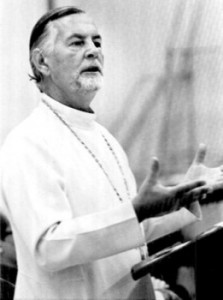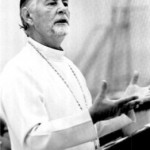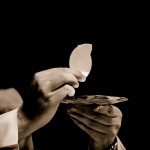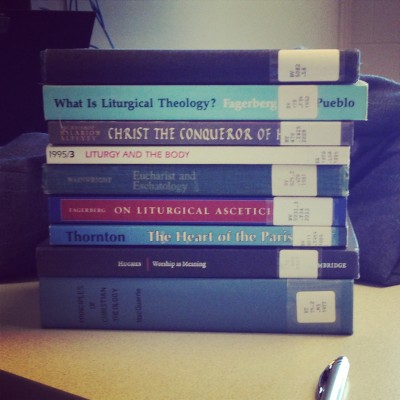My work has been very heavily influenced by Fr. Alexander Schmemann and I think he has a great deal to say on the subjects of liturgy, sacraments, and the church.
For those of you who may not know him: Fr. Schmemann was a priest of Russian descent in the Orthodox Church committed to liturgical theology and renewal. After a teaching period in Paris (1946-1951), he joined the faculty at St. Vladimir’s Seminary in New York where he remained until his death in 1983. Married to Juliana, he was awarded the title of Protopresbyter, the highest accolade available for a married priest in the Orthodox tradition. His writings cover the liturgical life of Orthodox Christianity and call people to a deeper understanding of and participation in the church’s worship and sacraments. I don’t think it is a stretch to claim that Fr. Schmemann is to liturgical studies/theology what N. T. Wright is to New Testament studies.
Yesterday was a beautiful juxtaposition of numerous Marian views within the Christian church. Roman Catholics and some Anglo-Catholics celebrated the Feast of the Assumption of Mary, other Anglicans celebrated the Feast of St. Mary, the Virgin and our Orthodox brothers and sisters are still in the midst of their Dormition fast (ending August 28 with the Feast of the Dormition). As I was sitting in the chair getting a tattoo from an Orthodox iconographer, I was reminded of Fr. Schmemann’s words in Great Lent regarding fasting and feasting. Bear in mind that the overall context for these quotes is in relation to the journey toward Lent. I offer them to you below…
“Every time the Church celebrates the Eucharist, she is ‘at home’–in heaven; she is ascending where Christ has ascended in order to make us ‘eat and drink at his table in His Kingdom…” – Fr. Schmemann, Great Lent, 47.
On feasting and fasting in Lent, he writes:
“As the sacraments and the celebration of the Kingdom, as the feast of the Church, it is incompatible with fast and is not celebrating during Lent; as the grace and the power of the Kingdom which are at work in the world, as our supplier of the ‘essential food’ and the weapon of our spiritual fight, it is at the very center of the fast, it is indeed the heavenly manna that keeps us alive on our journey through the desert of Lent.” – p. 48-49
He goes on to describe two different kinds of fasting:
“There are indeed two ways or modes of fasting rooted both in Scripture and Tradition, and which correspond to two distinct needs or states of man. The first one can be termed total fast for it consists of total abstinence from food and drink. One can define the second one as ascetical fast for it consists mainly in abstinence from certain foods and in substantial reduction of the dietary regimen…The Church has set apart four periods for this ascetical fast: the seasons before Easter, Christmas, the Feast of SS. Peter and Paul, and the Dormition of the Mother of God.” – P. 49, 51.
Fr. Schmemann suggests that the goal of the total fast is preparation for feast whereas the goal of the ascetical fast is “to liberate man from the unlawful tyranny of the flesh” (p. 50). Don’t we need both elements in our lives? As believers, I think it is essential that we prepare for the Feast of feasts (the Eucharist) and other major feasts within the church through total fasting. I also believe that periodic ascetical fasts can help train our passions and form us as people of the Spirit.
“The Eucharist as always the end of preparation and fulfillment of expectation; and the days of total abstinence and fast being the most intense expressions of the Church as preparation, they are ‘crowned’ with evening Communion.” – P. 53.
I could go on like this forever, but I’ll leave you with one more quote about the the significance of our lives and actions in both fasting and feasting, in preparation, expectation and fulfillment:
“Every word I say, every act I perform, every though passing through my mind becomes important, unique, irreversible, and either each is ‘in line’ with my expectation of Christ is in opposition to it…Our whole life becomes that which it was made by Christ’s coming into this world–ascension to Him, or running away from Him into darkness and destruction.” – P. 54.












